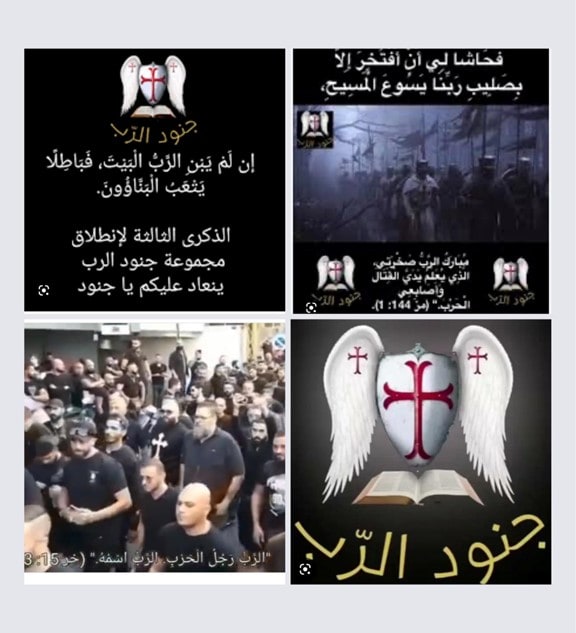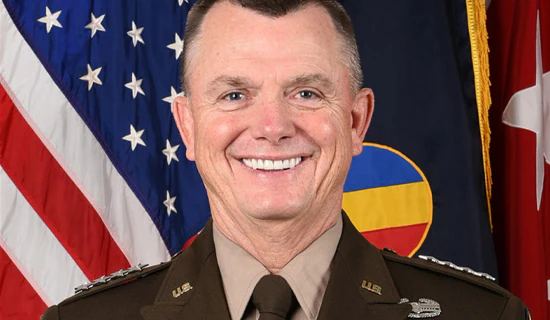The images are arresting and irresistible. Muscle-bound, tattooed men dressed in black, some of them heavily bearded, and carrying "regressive" religious symbols that provoke. But they are not Muslims but Christians – the symbols are crosses and rosaries – living in a Christian neighborhood in Beirut. As one commentator wrote, "taking the cross as a slogan, and the sacred Christian texts as a constitution," they call themselves Junud al-Rabb ("the Soldiers of the Lord"), with a white shield with a red cross and cross-marked angel's wings before an open Bible.

Although some point to an origin in 2019 and the group itself claims it began in early 2020, they burst on the public scene only this summer when they defaced some PRIDE Week propaganda in the staunchly Catholic Beirut neighborhood of Achrafieh, one of the most emblematic zones of the Christian resistance against foreign rule in Lebanon. Achrafieh's main square features a statue of the beloved Maronite Catholic saint Mar Charbel overlooked by a banner of slain Lebanese Forces/Kataeb leader and President-Elect Bashir Gemayel, assassinated there by Syrian Intelligence in 1982. Not far from the same square, in 2012, Lebanese General Wissam Al-Hassan, a Sunni Muslim and key intelligence figure, was assassinated by Hezbollah. Parts of Achrafieh were heavily damaged in the August 2020 Beirut Port Explosion.

Looking at news and commentary in Arabic about the group since this summer and continuing into December 2022, you would think that the Soldiers of the Lord was some sort of major organization.[1] And yet the largest number you can see in any of their photographs seems to be about 50 men. They may have sympathizers elsewhere (some accounts mention a presence in Zahle and Jal El Dib) but it still seems to be mostly limited to one neighborhood. Their social media presence is relatively larger, but still quite modest.[2] Sociologically, one can see in examining their publicity disparate elements somewhat akin to New York City's Guardian Angels, the Proud Boys, motorcycle gangs, drug rehab and reformed criminal support networks, bodybuilding gym rats and sports fans. They are, as far as media coverage is concerned, unarmed and there are no photos of them carrying weapons of any sort. One rare, relatively sympathetic account describes the group's members as "a group of young people from Achrafieh, specifically from some of its poor and very poor neighborhoods, with ages ranging from twenty to forty-five years of age on average." As far as religion, the group includes Maronites, other Catholics, Eastern Orthodox, Assyrian Christians and Armenians.[3]
One prominent supporter on Twitter, George Nasrallah, describes himself as part of the "Christian Right"[4] and the group's official YouTube channel[5] features a brief clip from a recent Donald Trump speech (subtitled in Arabic) lamenting that in today's educational system (in the U.S.) "school prayer is banned but drag shows are absolutely allowed, you can't teach the Bible but you can teach children that men can get pregnant and that kindergarteners are allowed to pick their own gender."[6]
But, aside from that one Trump clip, the rest of the group's YouTube channel is locally focused, with 31 videos and 17 short reels highlighting Christian themes, bible verses, and the need for repentance, in addition to videos show them walking the streets of the neighborhood in groups of 10 or 20, bearing a cross and praying. One video alone features the idealized image of the group's leader, Joseph "Zozo" Mansour.[7]

The politics of Junud Al-Rabb may be objectionable to some but not so unusual given the specific Lebanese Christian context from which the group springs. In so far as political allegiance is concerned, they clearly lean toward the Lebanese Forces party and against the FPM, the rival Lebanese Christian party led by Gibran Bassil and his senescent father-in-law Michel Aoun. They are surely anti-Hezbollah. But cultural and social issues loom larger than political or sectarian ones. They are, of course, virulently opposed to the aggressive LGTBQ+ agenda, opposed to abortion and also against civil marriage in Lebanon, an issue which they believe would open the door to same-sex marriage in Lebanon. Although they are aggressively "Christian" in their persona, the group features on their YouTube channel a TikTok video from a Sunni Muslim in Tripoli sympathetic to some of the group's social and political agenda.[8] On the other hand, one concerned Sunni Muslim woman asked on Twitter, "Question for the [Maronite] Patriarch, are the Soldiers of the Lord a militia or angels sent from God?"[9]
One of the more bizarre charges against the group is that it is somehow the Christian "counterpart" to Lebanese Hezbollah. The charge comes in two flavors. First it comes from secular or progressive Lebanese, very much in sync with the dominant ideology of the West, finding the group objectionable – seeing them as "Christian fundamentalists like Hezbollah and Iran are fundamentalists." There seems to be a social, class element here at work as well, of looking down at people of lower social status who act as if they actually may believe in Christianity as a religion, including all its moral tenets.

The second comparison to Hezbollah seems to come from pro-Hezbollah sources who deliberately exaggerate the power of this group. One account compared Soldiers of the Lord to "extremist groups" supposedly employed by the United States in Afghanistan against the Soviets, in Syria against Assad, to the Islamic State and "what is currently happening in Ukraine through Neo-Nazi groups."[10] In this pro-Hezbollah accounting, the group could wind up being employed – by the Americans – in sectarian violence against neighboring Muslim (Shia actually) areas with an aim to bring about the breakup of Lebanon into self-governing religious "cantons." Yet even this source places the group's strength as between 100 to 300 individuals. Kawalees magazine also claims that the group is funded by prominent Lebanese businessmen "known for their close relations with the Americans" Nabil Sehnaoui and his son Antoun Sehnaoui (a charge the latter has vociferously denied in writing and threatened legal action against those that make the accusation).[11] The idea, of course, that the U.S. government would have any connection with the group is insane. The American Embassy is more likely to fund Gay Pride Week in Lebanon than to support the Soldiers of the Lord.

Of greater concern is the charge from this pro-Hezbollah outlet that Junud Al-Rabb was involved indirectly in the dangerous clash on October 15, 2021, at Tayouneh when Shia demonstrators (and gunmen) were shot at by unknown attackers, killing six Hezbollah and Amal members. Hezbollah claims, without any real evidence, that the attackers were from the Lebanese Forces from the neighboring Christian neighborhood of Ain Al-Rummaneh. The pro-Hezbollah crowd's claim that Junud al-Rabb were also involved is that they "painted Christian religious slogans and crosses" in Muslim neighborhoods before the attack. This seems an even more far-fetched claim.
Another hostile media outlet, this one Aounist, describes the group as: "reportedly hostile to everything that is not religious, against the secular, leftist and communist, as well as opposed to Palestinian refugees and displaced Syrians... and the Aounists! They also reject civil marriage, homosexuality and abortion, and fight the drug trade as "the work of the devil," including individuals with a history of drug use. The mobilization is based on the glorification of the Crusades, and they attach their social media posts to Bible quotes about people's relationship with God and how they should be His soldiers on earth to defend their holy sites."[12]
One Lebanese political contact has, I think correctly, downplayed the group's importance, noting that they're "only a marginal thing. There is no training program, the main members are older and many of them are former drug addicts." The source noted, however, that some of them are former fighters from the Lebanese Forces but from decades ago. The idea that this particular tiny group, among so many others, including a Hezbollah with its own battle-tested army and 100,000 rockets, would somehow tilt the balance in Lebanon toward a new sectarian conflict seems ludicrous.

Any group that can be decried by both enlightened progressives and by Hezbollah propagandists has my sympathy. And one is particularly sympathetic to any working-class grassroots movement, no matter how modest or insignificant (or how murky their funding is), that pushes against the Western-style sexual revolution being imposed on the world. Most of the Arabic-language media coverage of the group is negative, whether from BBC and France24 or from Islamist or Aounist media outlets. Despite the expansive and incendiary rhetoric about the group, hard facts – as opposed to wild or unsubstantiated claims – can confirm only a handful of substantial actions: their June 2022 "vandalizing" of a rainbow flag flower display in Achrafieh;[13] their October 2022 demonstration against a pro-Michel Aoun judge; their campaign against an exhibit of colorful women's statues (supposedly pro-LGBT but actually for World Breast Cancer Day) set up in Sassine Square by artist Mirna Maalouf in October 2022;[14] according to Lebanese parliament member Paula Yacoubian, the group may have acted as vigilantes in preventing a robbery in Achrafieh in December 2022, a claim denied by Lebanon's Internal Security Forces;[15] and a December 2022 confrontation with Muslim bikers celebrating Morocco's World Cup victories that seemed to have included religious slogans and sectarian rhetoric on both sides.
Aside from the last item, which did not result in any real violence, these are issues unlikely to increase sectarian tensions in a Lebanon already prostrate by an unparalleled avalanche of economic, political, and social crises. Certainly, part of the appeal of this tiny group and similar efforts at creating neighborhood watch or self-defense groups is due to the steadily diminishing Lebanese state.[16] People are being left to fend for themselves. Depending on one's views on certain social or cultural issues, the Soldiers of the Lord may be very good or very bad, but the rhetoric about them seems, so far, wildly overblown. The rhetoric about the group is far more provocative than the group itself.
*Alberto M. Fernandez is Vice President of MEMRI.
[1] Youtube.com/watch?v=p8zyEh-dMto, December 28, 2022.
[2] Beirutobserver.com/2022/12/2750401, December 23, 2022.
[3] Lebanonfiles.com/articles/%d9%85%d9%82%d8%a7%d9%84%d8%a7%d8%aa-%d9%85%d8%ae%d8%aa%d8%a7%d8%b1%d8%a9/%d9%85%d9%86-%d9%83%d9%84-%d9%85%d9%83%d8%a7%d9%86-%d9%85%d8%aa%d8%b7%d8%b1%d9%91%d9%81%d9%88%d9%86-%d8%a3%d9%85-%d9%82%d9%85%d9%8a%d8%b5-%d8%b9%d8%ab%d9%85%d8%a7%d9%86-%d9%86%d8%ad%d9%86/
[4] Twitter.com/GoergeNasrallah, accessed December 30, 2022.
[5] Youtube.com/@-soldiersofgod4092, accessed December 30, 2022.
[6] Youtube.com/shorts/jy_bFCHSJbM, December 23, 2022.
[7] Youtube.com/watch?v=JybB-oFltVc, 2022.
[8] Youtube.com/watch?v=20ruB546KMk&t=35s, December 25, 2022.
[9] Twitter.com/ZAbouderhamein/status/1604920798954881068, December 19, 2022.
[10] Kawalees.net/?p=158949, December 27, 2022.
[11] Lebanon24.com/news/lebanon/1022648/%D8%AC%D9%86%D9%88%D8%AF-%D8%A7%D9%84%D8%B1%D8%A8-%D8%A3%D9%86%D8%B7%D9%88%D9%86-%D8%B5%D8%AD%D9%86%D8%A7%D9%88%D9%8A-%D9%84%D8%A7-%D8%B9%D9%84%D8%A7%D9%82%D8%A9-%D9%84%D9%86%D8%A7, December 23, 2022.
[12] Tayyar.org/News/Lebanon/511808, December 3, 2022.
[13] Youtube.com/watch?v=HgRawRURSb4, 2022.
[14] Daraj.media/100052, November 3, 2022.
[15] Youtube.com/watch?v=QzMUdcnMCPQ, December 23, 2022.
[16] Reuters.com/world/middle-east/beirut-neighbourhood-watch-echoes-troubled-past-2022-11-27, November 28, 2022.




